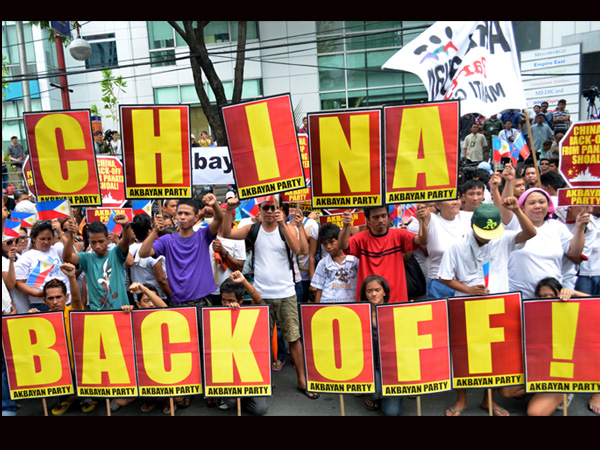
Filipino activists protests China’s reclamation in disputed waters of the South China Sea. INQUIRER FILE PHOTO/KIRK RONCESVALLES
Even if the Philippines wins its case in the international tribunal, its territorial dispute with China will be a long struggle, Supreme Court’s Senior Associate Justice Antonio Carpio said Thursday.
From July 7 to 13, the Philippines will face the Permanent Arbitration Court to argue China’s position that the Court has no jurisdiction to act on the Philippine government’s complaint before the United Nations Convention on the Law of the Sea.
The Arbitral Tribunal will also consider other matters concerning its jurisdiction and the admissibility of the Philippines’ claims. The Arbitral Court is expected to issue a ruling by August or September.
Then, another hearing will be conducted in November and the court is expected to rule on the merits in the first quarter of 2016.
The Philippines took China to the arbitral tribunal in January 2013 as it challenged the legality of the latter’s nine-dash line claim over nearly the entire South China Sea, including areas included in the Philippines’ 200-mile exclusive economic zone.
China’s sweeping claims over the South China and its aggressive stance, including the reclamation activities in Kagitingan, Zamora and Panganiban Reefs as well as the building of artificial islets over Mabini, Burgos, Calderon and Kennar Reefs, has rattled the nerves of other claimant countries, particularly the Philippines and Vietnam.
But Carpio said even if the Philippines win its case, getting China to comply could become an intergeneration struggle.
“If we win, all those reclamations of China are illegal and China has no right to stay there and China must vacate; but of course that’s the big problem how to enforce the ruling,” Carpio said in a television interview over GMA News TV’s “State of the Nation.”
“Once we have the ruling we will go to the world community, we will sponsor a resolution in the (United Nations) General Assembly every year that China should vacate, that China should comply with the rule of law, should comply with the ruling of Unclos (United Nations Convention on the Law of the Sea),” he said.
He cited several precedents where a smaller state took a bigger nation to international court. In the 1970s, he said, Nicaragua sued and won its case against the United States for mining its harbors.
Carpio said that like China, the US did not immediatelyrecognize the jurisdiction of the International Tribunal.
Eventually, the court ruled in favor of Nicaragua and ordered US to pay $30-million in damages. But the US refused to comply so Nicaragua sponsored a yearly resolution before the UN General Assembly to compel the US to comply.
Carpio said that support for the US dwindled every year until its remaining supporter was Israel. Then during the time of Nicaraguan President Victoria Chamorro, the US gave them $500-million economic aid.
“There was compliance in the end. If you look at the history of decisions of international tribunals, the compliance rate is over 97 percent.”
“Initially they will always say ‘we will not honor, we will not comply’ but the cause of noncompliance is much more than compliance so eventually they will comply. It will take time. So we should look at this as a long-term struggle even an intergeneration struggle. This generation will win that ruling, the next generation will convince the world, and the generation after that will convince China but we should not expect instant gratification here if we win this.”